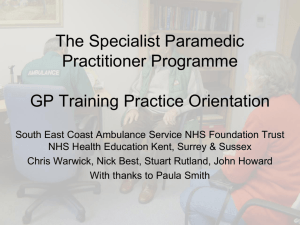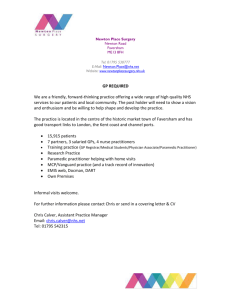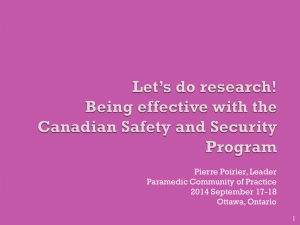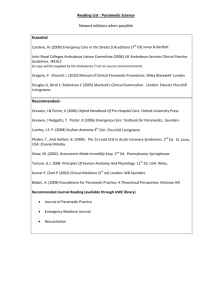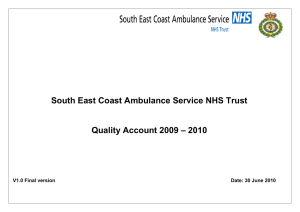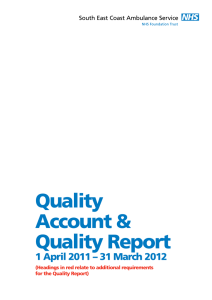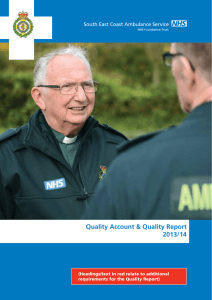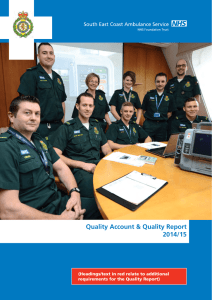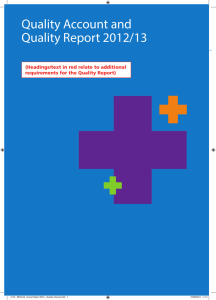The Paramedic Practitioner Programme 1
advertisement
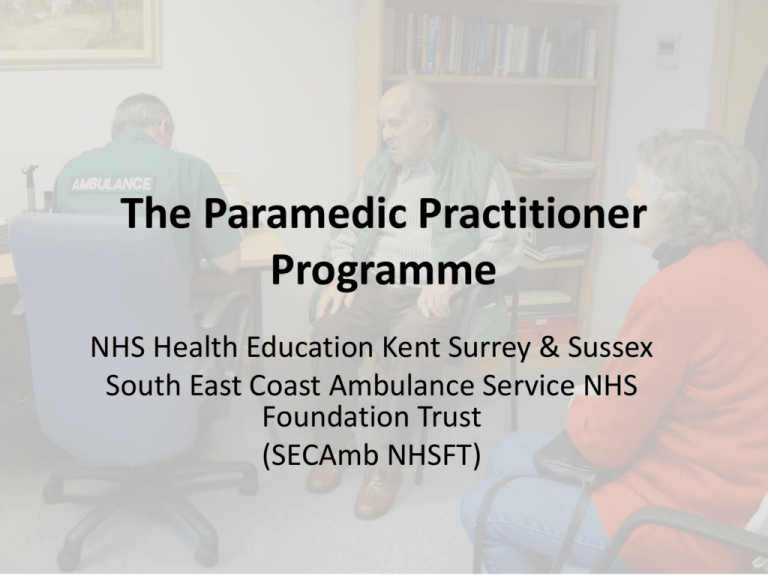
The Paramedic Practitioner Programme NHS Health Education Kent Surrey & Sussex South East Coast Ambulance Service NHS Foundation Trust (SECAmb NHSFT) The Paramedic Practitioner Programme 1 • Innovative Scheme • Degree course • Paramedics who are recruited who have 5yrs+ in the ambulance service • Aim to share with Paramedics the skills of Primary Care • Prevent unnecessary admissions • Provide an integrated service which can be taken to patients in their home The Paramedic Practitioner Programme 2 • Working towards co-ordinated care with community services • Competency based Curriculum • Based on clinical knowledge and skills development • For selected Paramedics- a 14 month pathway • Devised by SECAmb following review of ECP (Emergency Care Practitioner) programme, currently taught at St George’s • Congruence with DoH NHS strategy The Paramedic Practitioner Programme 3 • Programme development: – 2 year workplace based programme pilot – Roll out in KSS GP Training Practices – Evaluation • Collaborative development of Curriculum document • Recruitment and implementation – Current ‘experienced’ Paramedics – Future career pathway for graduate Paramedics The GP Placement Content 1 • Acute presentations in GP in Primary Care: – working in different environments – clinical assessment, management, – communication, continuity of care – wide spectrum of presentations • Consulting skills: – GP models vs traditional medical model • Clinical examination skills: – beyond traditional paramedic training The GP Placement Content 2 • Treatment skills: – suturing, minor abscess drainage, – appropriate medicine management using Clinical Management Plans (CMP)s & Patient GroupDirectives (PGD)s, – ‘The paramedic as the drug’ (after Balint) • Team-working in primary care teams • Familiarisation with GP IT systems • Introduction of the Generalist Role Teaching and learning • Time table for 2 months • 37.5 hr week (vaiable) • Induction to whole team, building relationships, understanding roles. • Tutorial weekly (link with case based discussions), time for assessments • Needs assessment • Staged progression as with GP STs, initial observation/joint/independent practice Evidence based Clinical Management Plans Patient Group Directions for any treatments in these plans Clinical Management Plan for Gastroenteritis CMPs are developed by Paramedics + GPs. Approved through SECAmb NHSFT governance processes Inter-professional model of Learning and Teaching Assessment of the PP in GP Collecting the evidence Using the tools of the Workplace Based Assessments: • • • • • Case-based Discussion Consultation Observation Tool Multi-Source Feedback Patient Satisfaction Questionnaire Clinical Evaluation Exercise (MiniCEX) • Clinical Supervisors Report Curriculum Development South East Coast Ambulance Service NHS Foundation Trust. (SECAmb NHSFT) St Georges University of London and Kingston University South East Coast NHS Strategic Health Authority Health Education Kent Surrey and Sussex The Paramedic Practitioner Curriculum PCTs Surrey, Sussex and Kent, Framework, Rationale and Royal College of General Practitioners Competences Document Patient Representation PARAMEDIC PRACTITONER PROGRAMME Minor Illness Minor Injuries Paediatrics Elderly Psychiatry GP Practice Placement Nature of physical Assessment Return to Study Psiam Clinical Pharmacology Decision and Making Therapeutics Operational Consolidation Walk in / Urgent Care Centre 8 weeks (26 days backfill) 7 days per week rota GP surgery Mon to Friday WIC Saturday and Sunday Timed as required waiting to return to GP practice (extracted 36 days) Clinical Secondment can respond to local Cat A if free. Working in Operations Minimum 6 months Maximum 10 Completed prior to joining GP surgery Total 20 weeks 45 academic points Pass required to enter next stage Clinical 2 weeks Working in Operations extracted 1 day week for 18 weeks GP Practice Placement including final assessments Total timeframe 120 days over 18 months (Each day 12 hours) KEY HEI Module GP Placement 8 weeks (26 days backfill) GP surgery Mon to Friday Walk in Centre Consolodation Clinical Secondment can respond to local Cat A if free. Timeframe and extraction Area of working HEKSS pilot PP placement programme Evaluation Report Prof Annemarie Rushton Key findings of first placements general • Highly successful and valued programme • Wide spectrum of patients and conditions • Competencies developed: – Communication & consultation – Data gathering – Making differential diagnosis – Clinical management Key findings of the first placements– PP perspective • The style of teaching and supervision – Sound work based, experiential environment – Supervision by trained educators – Based on assessed needs and learning styles – Cemented theoretical learning > practice • Process problems with assessment – Format – Volume – Time and inconvenience to all Key findings of first placements – GP perspective PP students • Motivated and self-directed • Improved on all competence areas • Are or will be autonomous practitioners Business issues • ‘Frontloaded’ – clinical time lost at beginning • Needed to understand before exposing ST3 Happy to take further PPs Evaluation Recommendations • • • • Streamlining workplace based assessments Calibration for supervisors [ST3 & other GPs] Clearer introduction / induction guidance Potential benefits for hosting PP students – Business case to training practices • Selection / screening less appropriate PPs – Poor team-working, poor assessment skills Where to from here? • Roll out the SECAmb NHSFT / HEKSS PP programme – Consolidate existing GP training practice placements – Introduce new GP training practices – Continue the developmental dialogue – Involve the ST3s and other GPs • Further the interaction / relationship between GP and PP educators • Integrate PPs in local primary healthcare community • Nationally, open up the PP examination to other Ambulance Trusts • Apply to join RCGP Foundation for CPD support. PP Exam Development SHA Steering Group agree : ·‘Fit for purpose’ examination ·PMETB principles ·Develop Train the PP Trainers ·Seek RCGP quality assurance Blueprint of curriculum for Exam design: •Applied knowledge test: •130 item MCP [SBA] format •Clinical test – 12 station OSCE •Workplace based assessment in GP training practices : • GP trainers and SECAmb PP tutors Quality Assurance from St George’s Hospital Med School, RCGP, College of Paramedics •Train SECAmb PPs in test writing & examining •Standard setting [pass / fail] •Simulated patients •Conduct of examination •Statistical analysis •RCGP accreditation PP Exam – RCGP accredited OSCE exam [and resit] 2011 MRCGP CSA centre, Croydon Summary 1 • Good example of integrated care. •Excellent opportunity for ST3 trainees to become involved in teaching and assessing. •Excellent opportunity for Paramedic Practitioners to learn about Primary care. Summary 2 •A good opportunity to help our patients by giving them appropriate continuity of care in the community. • Decrease admissions, save money for PBC groups. •Good for the practice team to form links with Paramedics.
